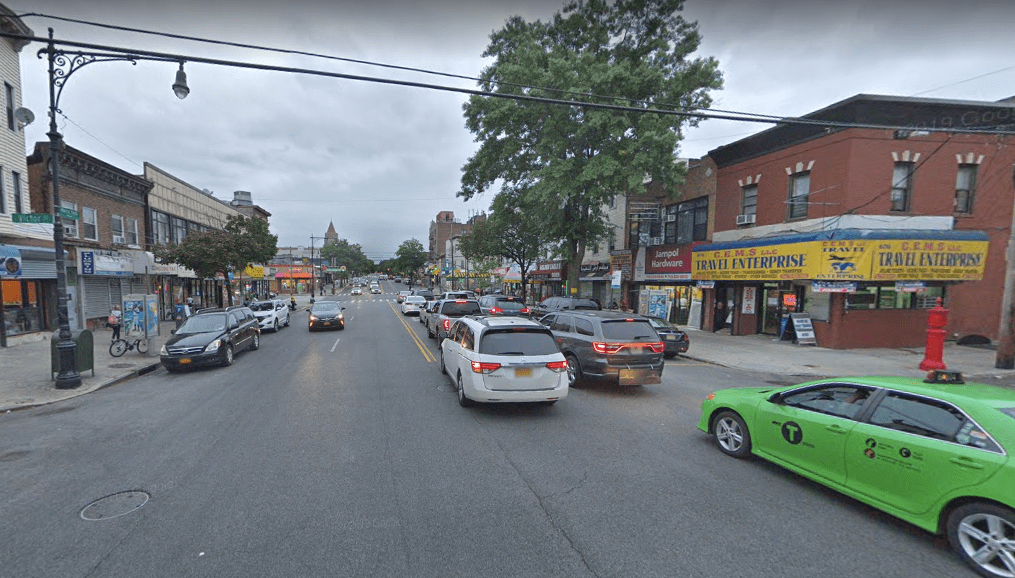A Bronx judge has ruled that the city can move forward with its basic "road diet" plan for dangerous Morris Park Avenue, ending a lengthy litigation that hinged on whether the city has the legal right to undertake a road configuration that literally exists in dozens of places across town.
Judge Lucindo Suarez declared the road redesign a proper "administrative act taken within the purview of [the city's] jurisdiction and scope of their statutory authority under the New York City Charter, supported by a rational basis rooted in the public health and safety. Therefore, Petitioners' requests for a preliminary injunction, reasonable attorneys' fees and costs are denied."
Naturally, DOT Commissioner Polly Trottenberg was overjoyed.
“DOT thanks Judge Suarez for his thoughtful decision that allows our critical safety project along Morris Park Avenue to move forward," said the streets boss, who is currently weathering multiple ongoing lawsuits by self-styled community groups to delay life-saving projects. "As we have seen dozens of times under Vision Zero, simple ‘road diets’ like this save lives. We expect to begin this roadway work next week — and as with all our projects, we expect to be on the ground monitoring changes closely, working with local stakeholders.”
This month we'll begin safety improvements along Morris Park Ave between Newport Ave & Adams St in the Bronx. This project will:
— NYC DOT (@NYC_DOT) October 18, 2019
⬅️Install painted center median with left turn bays
🚲Add #bikenyc lanes in each direction
🚗Reduce to one travel lane in each direction pic.twitter.com/uk8w2xpywa
At issue in the case was local business owners' claim — joined by Council Member Mark Gjonaj — that the DOT's plan to transform the dangerous, four-lane speedway into a narrower roadway with one lane of traffic in each direction, plus a painted bike lane and turning bays to prevent left-turning drivers from backing up traffic.
Such configurations exist citywide — and DOT has presented reams of statistics to show that they lead to reduced crashes and minuscule changes in overall drive times. The DOT stood by its plan, despite some opposition among the business community and the neighborhood's entitled car owners, who sued, claiming that the city agency is not legally empowered to make such basic road reconfigurations.
The plaintiffs — a group of small businesses owners, plus the Morris Park Community Association and Gjonaj — made several typical NIMBY claims — namely that their concerns were not heard (though there were several public hearings on the matter, plus private meetings between DOT officials and local electeds); that the strip between Adams Street and Newport Avenue is not unsafe (even though 426 pedestrians and cyclists, plus hundreds of drivers, have been injured, with one fatality, since 2010); and that sales will suffer if drivers are inconvenienced.
They had also put Vision Zero itself on trial, arguing that "Vision Zero is solely [the city’s] own administrative creation, or quasi-administrative because it was not authorized by legislative authorization or directive."
Suarez's ruling set that argument aside.
"Section 2903 of the New York City Charter statutorily empowers the DOT Commissioner with board [sic] discretion to promulgate rules and regulations for the conduct of vehicular and pedestrian traffic in the streets as may be necessary," Suarez wrote, likely meaning "broad" discretion. (He then quoted the regulation chapter and verse.)
The Morris Park Avenue reconfiguration, he concluded, "was an administrative act taken well within their statutory mandate pursuant to the New York City Charter."
Suarez also dismissed the notion that Gjonaj had standing to sue on the grounds that his legislative authority was somehow nullified.
"The Councilman suffered no direct or personal injury, whereby, standing could be conferred upon him," Suarez ruled. "Petitioners alleged injury with respect to the Councilman is more general in nature and it lies with the Legislature as whole, if in fact, the Morris park Street Improvement Project proceeded without express legislative authority. Therefore, the Councilman lacks the requisite standing to legally challenge the implementation of the Morris
Park Street Improvement Project, and his only alternative forum is to avail himself of the political process.
Suarez's ruling [posted below] comes as the city is finally starting to move past a series of lawsuits challenging its authority to make improvements for safety or for transit. Last month, a judge set aside a lawsuit challenging the DOT's plan for a car-free "busway" on 14th Street. And in July, a Manhattan judge allowed the city to begin construction on the Central Park West protected bike lane. (Both suits are pending final rulings.)
And in September, a Queens judge set aside a lawsuit by some store owners in Ridgewood, who claimed a dedicated bus lane on Fresh Pond Road would hurt their business.
This is a breaking story and has been updated — and it will be updated even more later!
Ruling Coquis Sales Et Al v. Mayor DeBlasio Et Al by Gersh Kuntzman on Scribd






